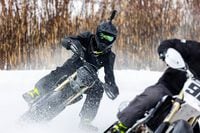Just as the 1973 Z1 motorcycle launched Kawasaki into the four-stroke Superbike era, the 1984 Ninja 900R sportbike, also known as the GPz900R, massively advanced the breed with a sophisticated combination of aerodynamic styling, a racetrack-bred chassis, and liquid-cooled four-cylinder performance. With dual overhead camshafts, 16 valves, semi flat-slide carbs, and an internal counterbalance, its 908cc inline four produced liter-bike power for the time. It could also burn down the quarter mile in 11.18 seconds at 121.65 mph, as tested by our sister publication Cycle World, and top out at 151 mph, making it the quickest and fastest production Kawasaki motorcycle to date. Equally important, the new Ninja 900R made riders look and feel great, with crisp handling, superb performance at high speeds, and forceful braking.
Technological advances abounded for Kawasaki within the Ninja 900R, including the first use of a new “diamond” frame that used the engine as a stressed member, a racing-derived 16-inch front wheel, and an anti-dive fork with air-assisted springs. The wind-cheating bodywork set the Ninja 900R motorcycle apart visually, and its one-year-only red and charcoal paint scheme made the ’84 model unmistakable.
In addition to these features, what really set the Ninja 900R apart was its name: Ninja. Mike Vaughan, the Director of Marketing for Kawasaki Motors Corp., U.S.A. (KMC) at the time, had lived in Asia and knew about Japanese mythology and the Ninja warriors, legendary for their strength and stealth. He had named his Columbia 22 sailboat Ninja a full decade earlier, and when product planning started considering names for the new streetbike, Vaughan immediately thought, “Ninja!” It took some doing for the name to work its way through corporate channels, but after that, it was perfect. The Ninja name first appeared in the US market only, then expanded internationally.
The Ninja 900R worldwide press launch occurred in Monterey, California on December 7, 1983. Riding opportunities included a dragstrip competition at the Monterey Jet Center, followed by open lapping on the fast, original nine-turn Laguna Seca course. Others in the mix on the racetrack included the GPz750 Turbo, the GPz1100, and none other than 1983 AMA Superbike Champion Wayne Rainey. Recognizing the significance of the event for Kawasaki, Hiroshi “Henry” Noda, Vice President of Marketing at KMC, and Dr. Ohba, the President of Kawasaki Heavy Industries, LTD (KHI) at that time, were also present.
After earning numerous “bike of the year” awards, the Ninja 900R would soon be joined by the 1985 Ninja 600R model, the original “600 class” supersport with a new-style perimeter frame that would influence sportbike design for decades. And today, the complete line of Ninja sportbikes includes the Ninja H2 and Ninja H2R, Ninja ZX-14R, Ninja ZX-10R, Ninja ZX-6R, Ninja 650 and Ninja 300.










/cloudfront-us-east-1.images.arcpublishing.com/octane/LLZP6J3JAVXKN7FBCO4Q2BXHKA.jpg)


/cloudfront-us-east-1.images.arcpublishing.com/octane/3TIWWRV4JBBOLDVGRYECVVTA7Y.jpg)
/cloudfront-us-east-1.images.arcpublishing.com/octane/KIX5O23D5NAIBGFXBN3327DKZU.jpg)
/cloudfront-us-east-1.images.arcpublishing.com/octane/7GJYDUIPXRGMTMQKN6ONYOLBOU.jpg)
/cloudfront-us-east-1.images.arcpublishing.com/octane/MUQLOVLL2ZDGFH25ILABNBXKTI.jpg)
/cloudfront-us-east-1.images.arcpublishing.com/octane/TNOU5DNE2BC57MFPMGN2EIDXAM.jpg)
/cloudfront-us-east-1.images.arcpublishing.com/octane/GTCXACQGJ5HAPDTGWUQKDEH44E.jpg)
/cloudfront-us-east-1.images.arcpublishing.com/octane/S35YGSEMEZB4BLTDJTSZPF4GLA.jpg)
/cloudfront-us-east-1.images.arcpublishing.com/octane/5UOT6HPX2JFMRJAX6EH45AR4MQ.jpg)
/cloudfront-us-east-1.images.arcpublishing.com/octane/OKWOJWAKP5EP3OACCRRWPCIX2Q.jpg)
/cloudfront-us-east-1.images.arcpublishing.com/octane/2WF3SCE3NFBQXLDNJM7KMXA45E.jpg)
/cloudfront-us-east-1.images.arcpublishing.com/octane/G4MG6OUCJNBSHIS2MVVOTPX65E.jpg)
/cloudfront-us-east-1.images.arcpublishing.com/octane/IIGGWFOTOJGB7DB6DGBXCCMTDY.jpg)
/cloudfront-us-east-1.images.arcpublishing.com/octane/QSTCM6AVEZA5JJBUXNIQ3DSOF4.jpg)
/cloudfront-us-east-1.images.arcpublishing.com/octane/U4I7G625B5DMLF2DVIJDFZVV6M.jpg)
/cloudfront-us-east-1.images.arcpublishing.com/octane/B6XD6LS6IVCQPIU6HXDJSM3FHY.jpg)
/cloudfront-us-east-1.images.arcpublishing.com/octane/ICL63FEDDRDTTMINYICCEYGMDA.jpg)
/cloudfront-us-east-1.images.arcpublishing.com/octane/FCGZHQXRBZFLBAPC5SDIQLVF4I.jpg)
/cloudfront-us-east-1.images.arcpublishing.com/octane/WNOB6LDOIFFHJKPSVIWDYUGOPM.jpg)

/cloudfront-us-east-1.images.arcpublishing.com/octane/X33NU3E525ECRHXLNUJN2FTRKI.jpg)
/cloudfront-us-east-1.images.arcpublishing.com/octane/6KKT5NNL2JAVBOXMZYS5ZO76YA.jpg)
/cloudfront-us-east-1.images.arcpublishing.com/octane/J5RKG5O455GMPGQRF2OG6LRT7A.jpg)
/cloudfront-us-east-1.images.arcpublishing.com/octane/GX2CIZKQVRH2TATDM26KFG2DAE.jpg)